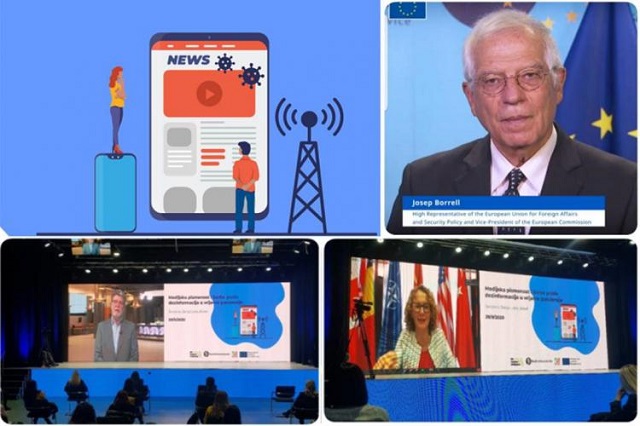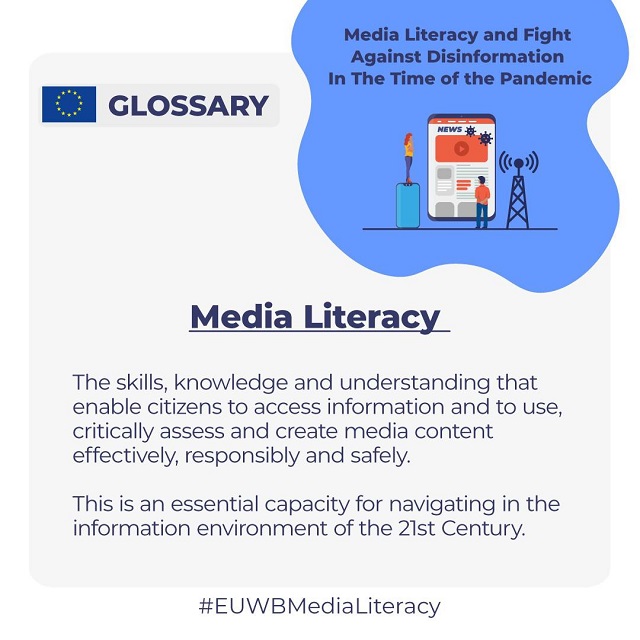The first edition of the EU – Western Balkans Media Literacy Conference took place on 29 September gathering fact-checkers, youth, journalists and authorities from the Western Balkans, the EU and beyond discussing media literacy and fight against disinformation. The Conference conclusions stress the need for all actors – EU, local authorities and civil society – to invest in education, engage with youth, support professional journalism and fact-checkers in order to strengthen democracy and counter disinformation.
Addressing the conference at its opening, the EU High Representative/Vice-President Borrell said:
“During the pandemic crisis, fact-checkers and media organisations in the Western Balkans debunked fake news, exposed disinformation trends and informed citizens. Fact-checking organisations linked up with partners in the region, worked across borders and teamed up with organisations in the European Union, and made an important contribution to the public debate. Your work does not go unnoticed. It empowers people and the youth to speak their minds and to become agents of change.”
He also added:
Read also
“With most of today’s participants being from the Western Balkans, let me conclude by saying what I have underlined several times before: the European Union is not complete without the Western Balkans.”
Conference conclusions
The conclusions(link is external) stress that education has a crucial role in fighting disinformation. While capable of using new technologies, young people need to be empowered via formal and informal education in order to process, understand and interact with the large amount of information they are exposed to. Adults should not be forgotten as they are also exposed to disinformation and often less used to new technologies. Critical thinking and media literacy are vaccines against the infodemic as well as attacks on and questioning of science.
The conclusions stress that professional journalism is essential for democracy. Media need to be supported so that quality of reporting and investigative journalism can be enhanced. Regional fact-checking organizations need to increase their cooperation with government and educational institutions as well as media and tech companies. The Third-Party Fact-Checking partnership between fact-checkers and Facebook is a positive development.
As the conclusions end: the EU will continue to work closely with Western Balkans partners, and is committed to helping the region build resilience in order to strengthen democracy and counter disinformation.
Words matter: a helpful glossary
For citizens who need to know how to navigate in the digital information space, words matter. In the run-up of the Conference, the EU engaged in a social media campaign based on a glossary(link is external) that provides definitions of the topics discussed at the conference, such as disinformation and media freedom.
EU-Western Balkans Media Literacy Conference and follow-up
The first edition of the EU – Western Balkans Media Literacy Conference was titled “Media Literacy and the Fight against Disinformation in the Time of Pandemic”. Hundreds of participants discussed online and on location in Brussels, Sarajevo and Banja Luka (Bosnia and Herzegovina) media literacy and anti-disinformation policies, the impact of the pandemic on media literacy and media credibility and youth.
The conference featured a number of distinguished speakers and participants including Minister of Defence of North Macedonia Radmila Šekerinska, Member of the European Parliament Tonino Picula, EU Head of Delegation/Special Representative in Bosnia and Herzegovina Johann Sattler as well as fact-checkers including Darko Brkan and Tijana Cvjetićanin part of the SEECheck Network(link is external), artists such as Brano Jakubović from Dubioza Kolektiv(link is external) and representatives of students associations such as Adnana Turkić from the Association of Secondary School Students of Sarajevo.
Organised by Western Balkans fact-checkers, youth organisations and the EU, the event is part of EU’s activities aimed at enhancing societal resilience in Bosnia and Herzegovina and the whole Western Balkans region through support to media literacy, youth empowerment, and the strengthening of civil society and media freedom.
The EU is working on follow-up activities to the Conference, including a second edition probably to be held in another Western Balkans capital in 2021.
European Union



























































